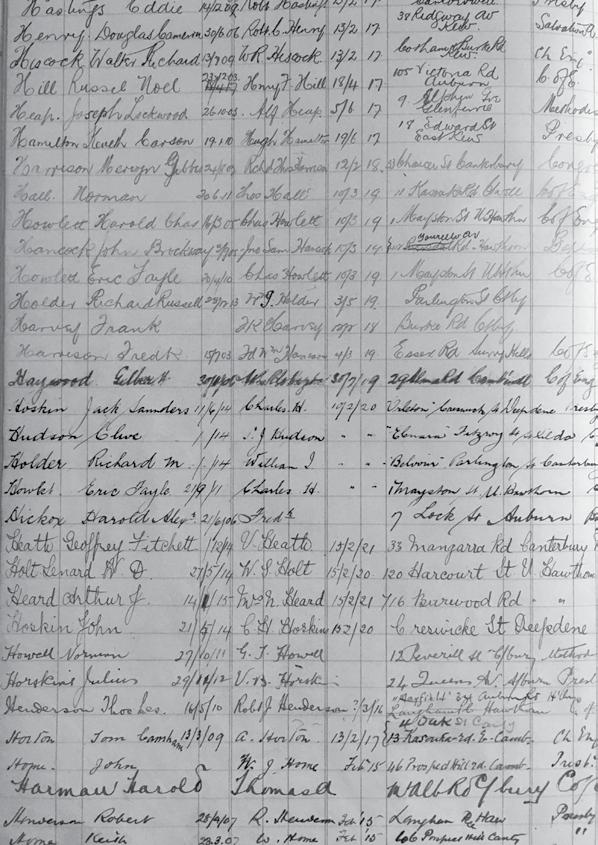
3 minute read
From the Archives
Camberwell Grammar Council Minutes, June 1930.
Parents are an integral component of Camberwell Grammar today, supporting school activities in every area. However, it was not until the linking of the School with the Church of England in the mid-1920s that parents, through their own Association, were offered a worthwhile role in the institution they had come to trust. Although initially focused on fundraising, their attention was soon broadened by 1945 to other issues of importance in the running of the School.
The transformed Camberwell Grammar School from 1927 was facing increasing financial challenges in part owing to the acquisition of a gymnasium (at the insistence of the new headmaster Dr Buntine) on the Burke Hill campus. Parents were now seen as a group who could help to fund such acquisitions and, accordingly, Council President, the Reverend J.A. Schofield, welcomed them to a meeting in the Kintore Street School House on 29 April 1929. About one hundred attended and a committee was elected for a ‘Parents’ Association’, a group that was soon organising activities in order to remove the gymnasium debt of £250. Their first annual ball, a short time later, resulted in a profit of £125, a sum that was used to furnish and equip ‘The Gym’. Soon a fundraising period of ‘violent agitation and activity’ (as the Grammarian described it) followed, intended to raise an additional £500 towards the purchase of a new property for the School, with the tenanted Burke Hill campus deteriorating; at least £30,000 would be needed.
Unfortunately, ‘Black Thursday’ on 24 October 1929, unleashed a financial tsunami on Wall Street and Camberwell Grammar could not hope to escape the economic downturn of this era, but the Parent Association soldiered on with what in 1930 it called ‘valiant hearts and a praiseworthy optimism’. Parents faced the Great Depression with rigour, holding garden fetes, purchasing Commonwealth bonds, and forming a ‘Ladies Social Committee’ to assist the functioning of the Association. In 1934 the Association also accepted the suggestion of Headmaster Henry Tonkin that it ‘donate annually a sum not exceeding £25 to establish a scholarship to the School to be known as The Parents’ Association Scholarship’. This scholarship proved of great benefit to students enduring the continuing stringency of the 1930s. Once the School had shifted to its new campus on Mont Albert Road and was able to celebrate its fifty-year Jubilee in 1936, the Association was thanked for having raised over £1,087 since its foundation – this represents over $117,000 by today’s figures, an impressive amount.
In due course the Association survived the ‘Devil’s Decade’ of the 1930s, readying itself to face the challenge of war from 1939. Even before Pearl Harbour, it appealed to the governing School Council in April 1941 for the provision of an on-site ‘shelter shed’ for the pupils to protect them from potential air raids – Council extended its ‘full sympathy and support’ for such a project. However, it did not intend to pursue the issue of any shelter, Headmaster Tonkin being entrusted with the handling of a suggestion to be made to parents about an ‘Evacuation Scheme’ for pupils up to the age of fourteen –given any threat of air raids, evacuation seemed more ‘practicable’ than shelter, as British (and German) parents were discovering. Earlier financial concerns were sidelined during wartime, parental anxiety being focused elsewhere.
The Association expressed its concern to the Council in September 1941 about a ‘shortage of masters’, seeking assurances that the ‘former high standard of teaching would be maintained’ given the drift of many valued staff members (like Stan Brown, 1939-53) into the armed forces. With wartime issues of student overcrowding in mid-1944, plans were soon accelerated to raise funds for a needed ‘War Memorial’ school extension, Council again resolving to seek the assistance of the Parents’ Association in the same way they had done in the late-1920s. Post-war planning was now underway as the School approached an enrolment of 400, and the Association accepted that an expanded staff ‘of the calibre desired’ could only be obtained through increased salaries. Any elevated remuneration would be funded through increased fees, the Parents’ Association endorsing this measure before the end of the war in 1945 in accordance with their previous lobbying for the improvement of staff. Such parental acceptance of higher fees was the ultimate sacrifice in the interests of the School community as a whole, a theme that the Parents Association had pursued since its foundation fifteen years earlier. It is a theme that the parents of today continue to follow.
Dr David Bird School Historian and Archivist










